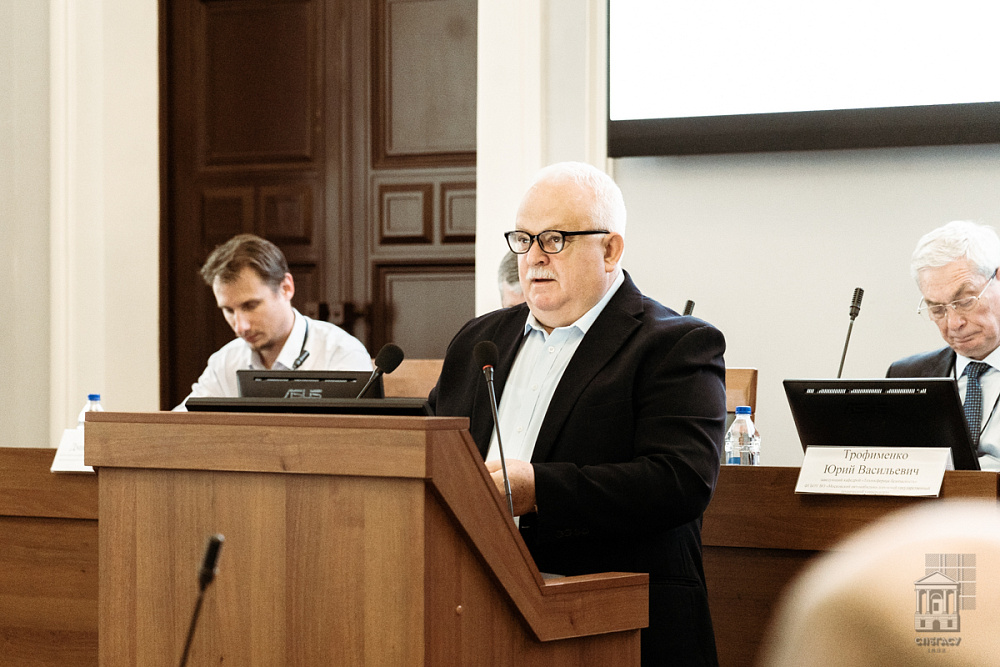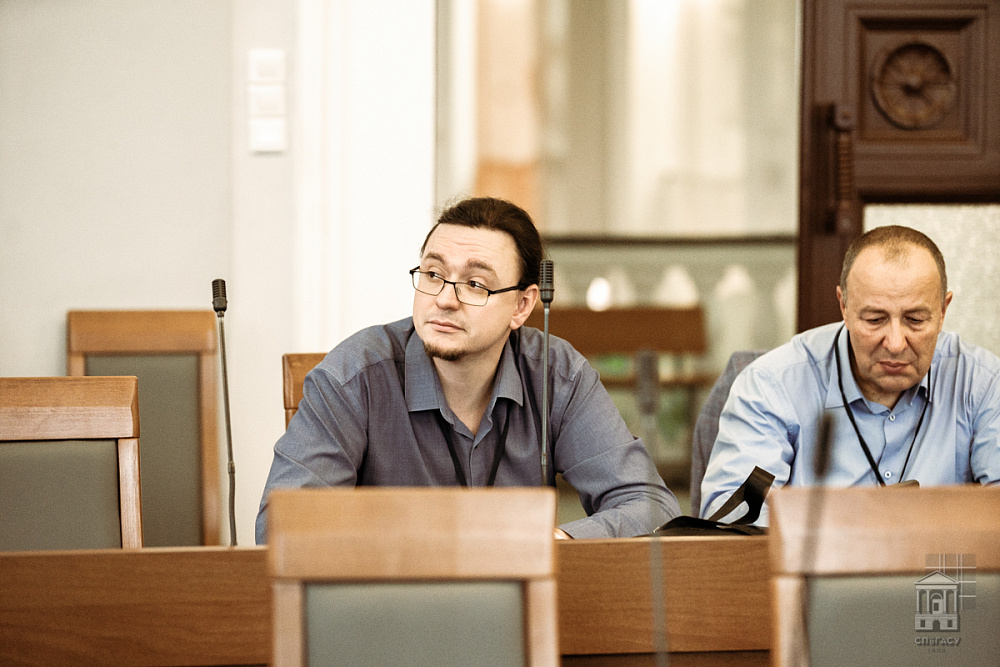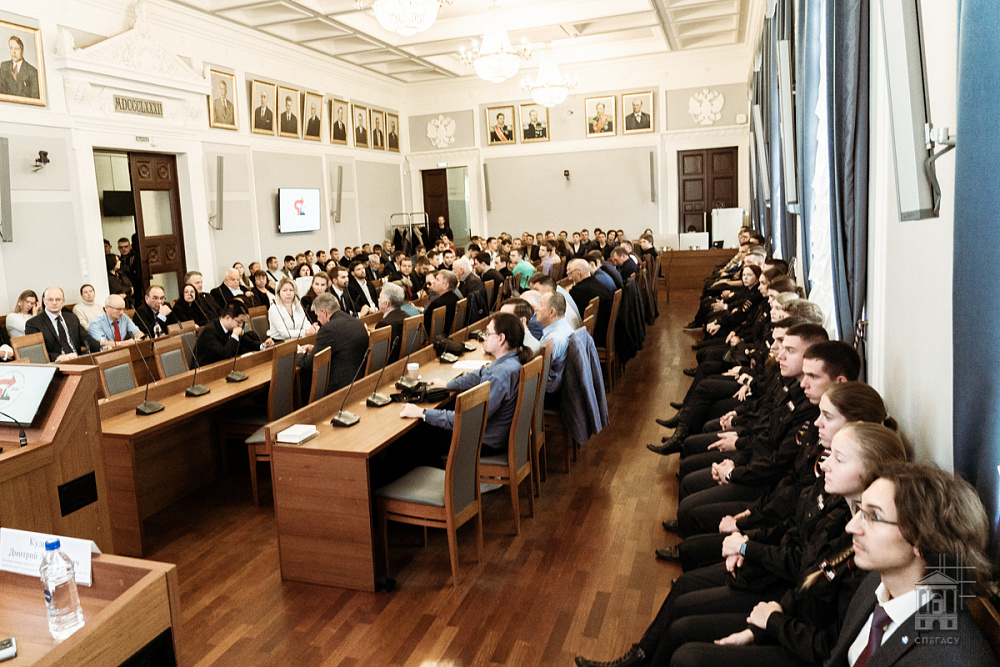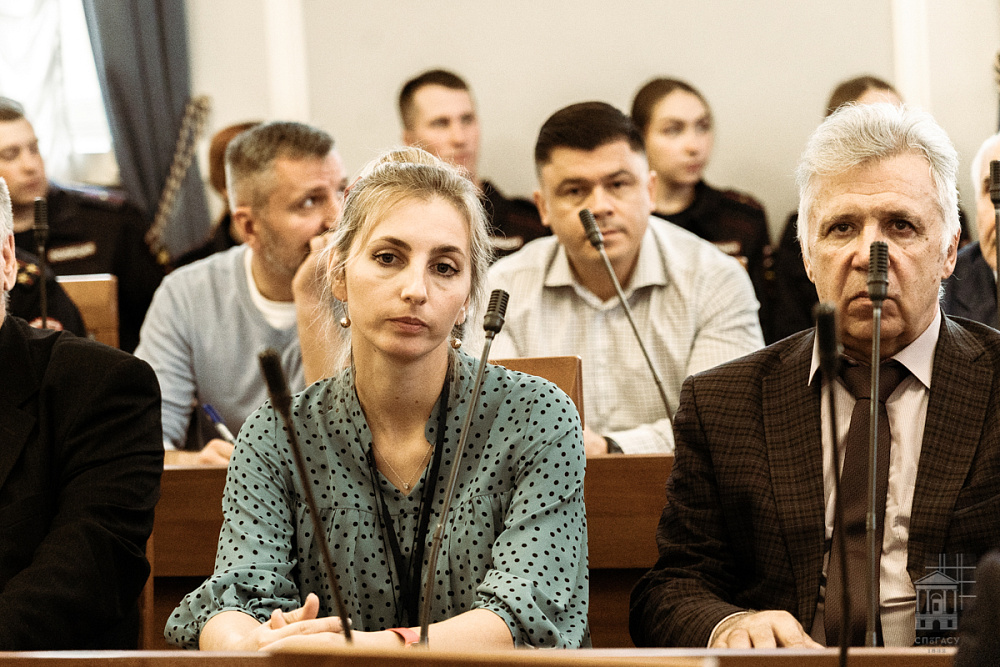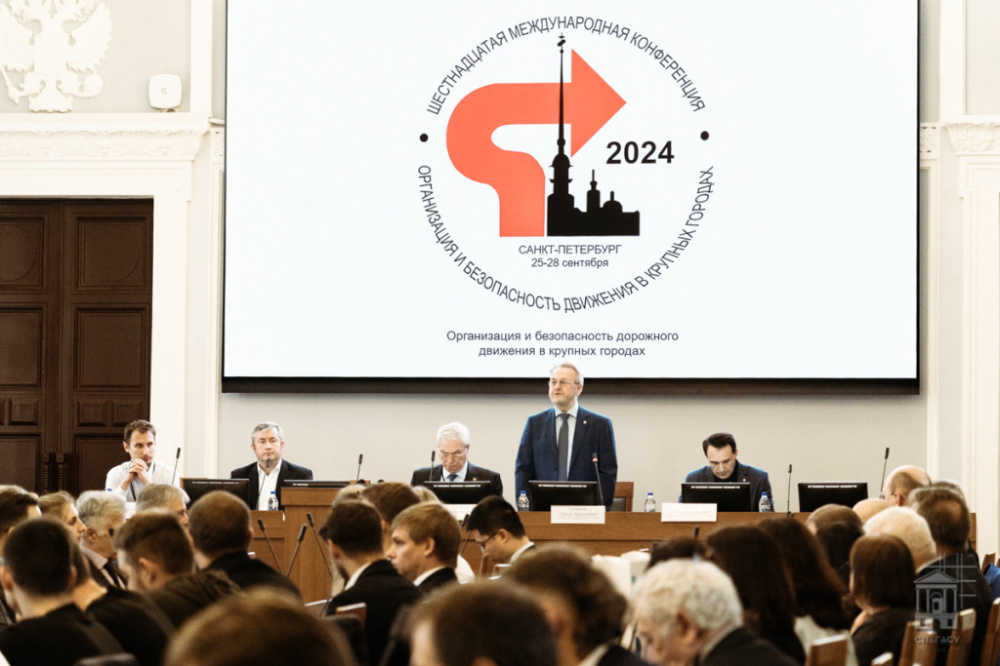 Dmitry Kudinov, Mikhail Prisyazhnyuk, Yuri Trofimenko, Sergey Evtyukov and Evgeny Korolev
Dmitry Kudinov, Mikhail Prisyazhnyuk, Yuri Trofimenko, Sergey Evtyukov and Evgeny Korolev
SPbGASU hosted the 16th International Conference "Organization and Safety of Road Traffic in Large Cities". Over the course of four days, representatives of the government, state structures and industry, scientists, students and postgraduates discussed the main thing at various sites of our university: how to make the transport system safer and more convenient for all road users, taking into account new trends.
In memory of Professor Pavel Kravchenko
This year the conference was dedicated to the memory of Pavel Aleksandrovich Kravchenko – a world-class scientist, DSc in Engineering, professor, initiator of the creation of the SPbGASU Institute for Traffic Safety and its director.
Sergey Evtyukov, DSc in Engineering, Professor, Director of the SPbGASU Institute for Traffic Safety said that Pavel Kravchenko came to the motor transport industry as a mechanic at the Gorky Automobile Plant. He later graduated from the mechanical engineering and road faculty of LISI (now SPbGASU) and rose from assistant to professor, head of the laboratory and then to dean. Academician of the Academy of Transport of the RSFSR, Honored Worker of Higher Education, member of the Commission for Ensuring Road Safety under the Governor of St Petersburg, Honorary Chairman of the Council of the NP "Technical Control and Diagnostics", author of numerous scientific papers, books, textbooks, educational standards, devoted his entire life to his chosen industry. With the direct participation of Pavel Kravchenko in 1997, the system of state technical inspection of motor vehicles in Russia and the technical inspection system of St Petersburg were created, which before the reforms were considered the best in the country. He became the founder of international conferences on the organization and safety of road traffic in large cities, which are constantly held at SPbGASU. It is no coincidence that the participants of the current conference proposed naming the SPbGASU Institute for Traffic Safety after him.
"Only in recent years, under the leadership of Kravchenko and with his direct participation, the concepts of road safety and the development of the State Traffic Inspectorate of Russia were developed. In 1995, Pavel Aleksandrovich created the first and only doctoral council in the North-West in the specialty "Operation of road transport" and was its chairman for 27 years. His work will continue to live with us," said Sergey Evtyukov.
Innovations to the rescue
The plenary session of the conference was opened by the SPbGASU Vice-Rector for Research Evgeny Korolev.
"Road safety will always be the focus of attention of prominent scientists, the country's leadership, and government agencies, because living conditions are changing and require a search for modern safe conditions. In this regard, it is necessary to create new ways to ensure the operation of the transport system, follow technological progress, and introduce innovations. As practice shows, this conference allows for a comprehensive assessment of the current situation and prospects in this area, exchange experiences, and outline solutions to priority tasks," said Evgeny Korolev.
Andrey Petrov, Director of Production and Technical Policy of JSC North-West Regional Center of the Almaz-Antey Air Defense Concern – Obukhov Plant, agreed that the conference has become a place of attraction for scientists, specialists, engineers, students, and postgraduates and is proving its effectiveness.
Yaroslav Raichik, DSc in Engineering, Professor, Head of Department at the Czestochowa University of Technology (Poland) emphasized the long-term work of the conference and recalled that in the field of road safety there are many areas, scientific and technical solutions, methodological guidelines for specialists who focus on preserving human lives in the road operation system.
"Our age of accelerated pace introduces digital technologies using machine learning, which will soon be widely included in all areas of the road safety matrix. This will allow for faster and more accurate accounting of indicators," believes Yaroslav Raichik.
“In difficult times, transport accessibility and logistics have become the main indicators for achieving the goals set by the president, and cooperation with universities allows us to effectively solve scientific problems,” added Vladimir Grigoryev, Vice-Rector for General Affairs and Digitalization at Tula State University.
Doctor of Administrative Business, Vice President of the International Association for Accident Reconstruction and Expertise (LAAS) from the USA Gregory Ginzburg agreed that the innovations being implemented will prove their effectiveness and improve the situation on the roads.
How to control traffic flows
Kirill Razumov, deputy head of the Traffic Organization Department of the State Traffic Safety Inspectorate for St Petersburg and the Leningrad Region, clarified that the activities of the State Traffic Safety Inspectorate are assessed, among other things, based on the indicators and forecast values for transport risk and the number of fatalities in road accidents.
"These indicators can only be achieved under appropriate conditions and by implementing innovative solutions. In order to ensure the capacity of roads and organize traffic, it is necessary to work together with the authorities on ways to change the layout of streets and roads, because often the implemented engineering and technical measures have already been exhausted, and all road safety is limited by the capacity. Here come accidents. It is only possible to change the technical parameters of roads within the framework of reconstruction and construction, so the State Traffic Safety Inspectorate is working in this direction together with the authorities," said Kirill Razumov.
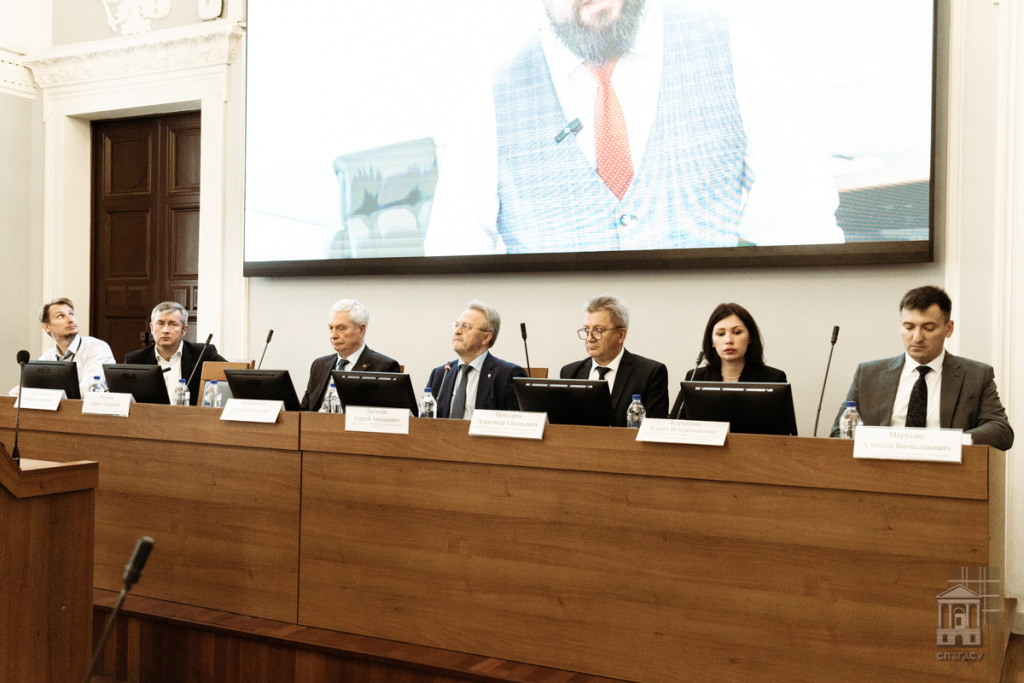 Dmitry Kudinov, Mikhail Prisyazhnyuk, Yuri Trofimenko, Sergey Evtyukov, Professor at the SPbGASU Department of Land Transport and Technological Machines Aleksandr Pushkarev, Head of the SPbGASU Department of Land Transport and Technological Machines Elena Kurakina, Associate Professor at the SPbGASU Department of Land Transport and Technological Machines, Director of the Driving school Aleksey Marusin
Dmitry Kudinov, Mikhail Prisyazhnyuk, Yuri Trofimenko, Sergey Evtyukov, Professor at the SPbGASU Department of Land Transport and Technological Machines Aleksandr Pushkarev, Head of the SPbGASU Department of Land Transport and Technological Machines Elena Kurakina, Associate Professor at the SPbGASU Department of Land Transport and Technological Machines, Director of the Driving school Aleksey Marusin
Professor, Head of the Department of Technosphere Safety at the Moscow Automobile and Road State Technical University Yuri Trofimenko sees prospects in the development of designs for highly automated and unmanned vehicles, transport infrastructure facilities, virtual and augmented reality technologies, since they generate a new social environment in which a new danger arises. But, as the professor noted, today science understands in which direction to develop. He is also engaged in scientific understanding of road issues in resort agglomerations.
"Statistics show that half of the country's population travels once a year. The number of tourists has doubled and reaches 50 million people at the peak of the resort season. According to VCIOM (Russian Public Opinion Research Center), 53 percent of them travel by car. With such rapid development of tourism, it is necessary to assess the load on the road network. Already now in the Krasnodar Territory at the height of the season there are seven tourists per local resident. A difficult situation arises on the roads due to multi-kilometer traffic jams, and the accident rate is off the charts, including due to motorists arriving from different regions. In order to predict the traffic flow, we will use traditional schemes of methodological approaches to the transport demand of tourists and local residents, its unevenness. This will allow us to develop optimal solutions. Assessing the relationship between tourism and transport is important for the country's economy, so specialists in motor transport science need to take these road flows into account," says Yuri Trofimenko.
Technologies, specialists and new-age transport
In order to reduce road accidents due to the fault of drivers, citizens who arrived from a number of countries in the Leningrad Region have been banned from working as taxi drivers and driving buses until 1 January, 2025. The regional authorities will then act based on the situation. This was reported by Mikhail Prisyazhnyuk, Chairman of the Leningrad Region Transport Committee.
"The number of vehicles and their speed are increasing, and the number of accidents is growing. To assess and control the situation in the region's transport system, we use big data, on the basis of which we make decisions. The creation of a digital circuit will allow, among other things, to organize a high-quality transaction system and debug geolocation. In addition, we are interested in the transfer of transport companies' vehicles to environmentally friendly fuel, so we will allocate subsidies of about 30 million rubles to organizations that decide to build a gas filling station," said Mikhail Prisyazhnyuk.
Yuri Lazarev, Director of the Higher School of Industrial, Civil and Road Construction of the Civil Engineering Institute of the St Petersburg Polytechnic University, emphasized that the situation on the roads is closely linked to urban development standards: active construction leads to traffic jams not only on the roads, but also on the sidewalks, so urban development standards should be more strictly prescribed.
"Environmental friendliness, road connectivity, the emergence of new transport hubs, reserves for increasing capacity are the components in achieving safe, high-quality roads, as the Governor of St Petersburg stated. Without this, the problem cannot be solved. In addition, now, in order to identify problem areas of roads, maximum human involvement is required, while errors still cannot be ruled out. In this case, the solution is the development of a geographic information system, since without big data it is impossible to analyze the impact on road safety. But developing such a system is not an easy task and requires many specialists," says Yuri Lazarev.
Solving transport problems really requires specialists with modern skills, and the problem of road safety in large cities is becoming increasingly urgent. This opinion was expressed by Professor at the Department of Information Resources Management of the Academy of Public Administration under the President of the Republic of Belarus, Professor at the Department of Transport Systems of the Belarusian National Technical University Denis Kapsky.
"Urbanization is growing, the attractiveness of the city is ensured by comfortable living, accessible services, and wide opportunities. Planning the development of sustainable urban transport systems requires a clear vision of the prospects for the use of modern technologies. It will be possible to improve the environmental safety of automobile and urban passenger transport due to its electric mobility. The transport sector has entered the information revolution, digitalization, and the traditional car with an internal combustion engine running on petroleum fuel will become a thing of the past by the end of the 21st century, becoming the same exhibit in museums as an adding machine and a cast iron. Therefore, our university is aimed at opening and promoting popular fields of study," said Denis Kapsky.
Educate and fine
Mass motorization has a noticeable impact on the entire way of life of a person, and along with the introduction of innovations, it is necessary to expand measures to prevent accidents on the roads. The Head of the Department of Special and Automobile Engineering of the St Petersburg University of the Ministry of Internal Affairs of Russia Anatoly Kvitchuk is convinced of this. According to him, a lot is currently being done in the transport system to improve safety, but statistics show that every third road user is a violator.
"For greater efficiency, it is necessary to approach the examination of problems in detail and make specific decisions depending on their specifics. For example, today a fine of 500 rubles is established for violations of cargo transportation. Violators prefer to pay fines rather than comply with the established transportation rules. Meanwhile, cargo that is not properly secured leads to the death of people driving nearby," Anatoly Kvitchuk emphasized.
People's awareness of the city's transport system and preventive measures play an important role in improving safety. This was confirmed by Dmitry Kudinov, executive director of the "Let's Go" association.
"The public movement makes a significant contribution to road safety. We conduct an effective dialogue with city residents, specialists, organizations and authorities. In this way, we generate initiatives and use all opportunities to implement them. Together, we manage to focus society's attention on behavior on the roads and create conditions for safety," explained Dmitry Kudinov.
Human factor
Associate Professor at the Department of Automobile Transport Operation at the Tyumen Industrial University, Artur Petrov, as a result of his research, came to the conclusion that attempts to improve traffic safety using known methods often lead to the opposite result, and the main cause of accidents remains the human factor, although external factors are also added to it.
"We were already working on the concept of an observation system with Pavel Aleksandrovich Kravchenko, we talked about the fact that if we can control the movement of each vehicle, the actions of each driver and pedestrian, then we will probably be able to achieve zero accidents. Today, this is not the case, so in my research I proceed from the opposite: let's say we can control the actions of all participants in the transport system. The best tool for identifying the specifics of accidents is the use of the information-entropy analysis method. Its essence lies in the fact that we study the transport system as a cause-and-effect chain in order to assess the weight significance of the elements of the system or its processes. It turned out that an attempt to eliminate conflict on the roads by complicating the cycle led to the opposite result: a long wait for a traffic light leads to traffic violations. But, as Pavel Aleksandrovich said, thousands of factors affect accidents, and our task is to prevent them. The information program I developed allows us to assess many of them," explained Artur Petrov.
Associate Professor at the Department of Technical Service of Machines at Penza State Agrarian University Irina Ilyina assessed the risks on the roads taking into account the preparedness of drivers.
The relevance of the topic is confirmed by statistics: in 2023, the number of accidents due to the fault of drivers increased by about 5%. According to preliminary results, the reliability of the driver lies in his preparation, and mistakes on the roads are made, among other things, due to ignorance of traffic rules.
The conference also included numerous sections devoted to road safety issues.




